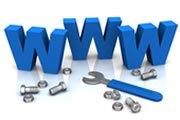In today’s global, tech-savvy market, a website is mandatory for almost any type of organization. However, if you don’t know exactly what should be on a website, you can easily end up with a useless tool that will likely cost you a lot of time and resources.
Without a well-designed, functioning website, potential customers will click right to your competitors. If your site is thrown together haphazardly, it could do you more harm than good. But if your website is developed properly, it could become your most valuable marketing tool.
There are numerous details to consider when deciding what should be on a website, including content, images, any required tools and applications (such as purchasing options), and many other components. Your goal isn’t simply to make the site appealing and useful, but also to design it so it ranks high on search engines and attracts quality traffic.
Five Essential Elements that should be on a Website
Below, we’ll take a look at five essential elements pertaining to what should be on a website, whether you operate a small web-based business or a global corporation.
1. A Strong, Clear Message on the Home Page
Your website home page should immediately tell the visitor who you are, what you do, and why they should use your service. This should be done as concisely as possible, ideally on the upper part of the home page. Most websites are vague and often difficult to navigate. Having a clear, customer-oriented message will help you set yourself apart and generate more leads.
2. Content that Helps Your Visitors
When considering what should be on a website, a lot of emphasis needs to be placed on developing effective and attractive content (or “copy”). This task is a lot more difficult than it seems since there is an extremely delicate balance that must be struck. If your website contains too little material, or text that is vague or difficult to comprehend, your visitors may be doubtful of the value you offer. However, if your content is too lengthy and reads like an encyclopedia, your visitors will likely lose interest before even reaching your call to action. Above all else you should seek to educate your customers about your products, services and how your particular expertise will help them achieve their goals.
3. Effective Calls to Action
If you’re spending time and resources on designing and launching a website, you likely intend for those who visit your website to do something. Pinpoint exactly what action you want your visitors to take. Buy your product? Download an e-book? Contact you regarding your services? Practically every page and subpage of your website should have a clear, concise call to action with information on how they can contact you, and should also request their basic info so you can follow up with them.
4. A Great ‘About’ Page
Believe it or not, the “About” page of a website usually receives more clicks than the “Services” or other seemingly more important pages. People are curious by nature, and often want to know who is behind a company or website.
Include details on not only your organization’s background, but also personal information that’s relevant to your business. This extra insight will help you develop a more personal connection with your customers or followers. If they can relate to you as a “real” person, this will go a long way toward swaying them to choose you over your faceless competitors.
5. A Blog
Adding a blog to your website can increase page views and position your company as an industry authority. Consistently publishing quality content and optimizing it for search engines will bolster your site’s SEO rankings – which means your site will be listed higher in major search engines like Google, Bing and Yahoo! – but if you don’t design, optimize, and maintain your blog properly, it can actually have the opposite effect. Commit to at least a monthly schedule of pushing out new content. We’ve seen a direct correlation between the size of your website and the amount of website traffic, leads, and inquiries.
Just Scratching the Surface of What Should be on a Website
With these five essential elements, we have only scratched the surface of what should be on a website and what it takes to build a high quality site. Proper website design is both an art and a science – balancing visual intrigue and aesthetic appeal with effective performance and proficiency. Integrating and starting with these five essential elements on your website will ensure that your website works for you, and not against you.
Get a Website Quote Today!
We’re experts at helping you craft the ideal website and can advise you about what should be on your website. Give us a ring today and find out how cost effective it can be to have an industry-leading website designed for your business.
Email or call us today at 727-562-5161. Press 1 to speak with a website expert who will help you build a site and ensure you have everything that should be on a website.

